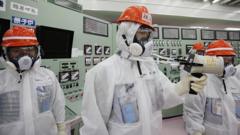Despite a decade of decline due to safety concerns and high costs, the nuclear power sector is witnessing a resurgence, with various countries re-evaluating their energy strategies in light of climate change. Major corporate players like Microsoft, Google, and Amazon are investing heavily in the sector, drawing attention away from its recent tumultuous history marked by disasters such as Chernobyl and Fukushima.
In the past, nuclear power was lauded for its vast energy potential, with uranium yielding significantly more energy than traditional fossil fuels. However, public apprehension over safety issues led to widespread opposition and a slowdown in development. The International Atomic Energy Agency reported a loss of 48 GW of electricity generation globally from 2011 to 2020. Conversely, countries like China have continued to ramp up their nuclear initiatives, recognizing its importance in meeting increasing energy demands.
Recent pressures to reduce carbon emissions and ensure energy security—intensified by the conflict in Ukraine—have fueled a renewed commitment to nuclear power among developed nations. For instance, South Korea has revoked plans to phase out its nuclear fleet, while France aims to expand its nuclear capacity, which currently supplies 70% of its electricity. The U.S. government has pledged to triple nuclear power generation by 2050, alongside agreements from 31 nations, including the UK and Japan, to pursue similar goals.
Additionally, nuclear power is now seen as a viable solution for tech giants' growing electricity needs. Microsoft has signed a 20-year agreement to revive the Three Mile Island plant, a site infamous for its 1979 incident. Meanwhile, Google and Amazon are exploring Small Modular Reactors (SMRs), seen as a more efficient and cost-effective alternative to traditional reactors.
Despite advances, nuclear power remains contentious. Advocates assert its necessity in achieving climate targets and express optimism regarding technological advances. In contrast, critics highlight the high costs of nuclear generation, cautioning against investments and advocating for investment in alternative renewable energy sources.
Moreover, the long-standing issue of radioactive waste disposal remains unresolved, with many arguing the geological storage solution poses significant risks. Only Finland has constructed a deep geological facility, while opposition persists regarding the long-term safety and efficacy of waste management strategies.
In conclusion, the path to a revitalized nuclear industry hinges not only on technological advancements and investments but also on addressing public concerns and the long-term viability of waste disposal methods. As global energy demands escalate, and climate goals become increasingly urgent, the future of nuclear power remains to be fully realized.
In the past, nuclear power was lauded for its vast energy potential, with uranium yielding significantly more energy than traditional fossil fuels. However, public apprehension over safety issues led to widespread opposition and a slowdown in development. The International Atomic Energy Agency reported a loss of 48 GW of electricity generation globally from 2011 to 2020. Conversely, countries like China have continued to ramp up their nuclear initiatives, recognizing its importance in meeting increasing energy demands.
Recent pressures to reduce carbon emissions and ensure energy security—intensified by the conflict in Ukraine—have fueled a renewed commitment to nuclear power among developed nations. For instance, South Korea has revoked plans to phase out its nuclear fleet, while France aims to expand its nuclear capacity, which currently supplies 70% of its electricity. The U.S. government has pledged to triple nuclear power generation by 2050, alongside agreements from 31 nations, including the UK and Japan, to pursue similar goals.
Additionally, nuclear power is now seen as a viable solution for tech giants' growing electricity needs. Microsoft has signed a 20-year agreement to revive the Three Mile Island plant, a site infamous for its 1979 incident. Meanwhile, Google and Amazon are exploring Small Modular Reactors (SMRs), seen as a more efficient and cost-effective alternative to traditional reactors.
Despite advances, nuclear power remains contentious. Advocates assert its necessity in achieving climate targets and express optimism regarding technological advances. In contrast, critics highlight the high costs of nuclear generation, cautioning against investments and advocating for investment in alternative renewable energy sources.
Moreover, the long-standing issue of radioactive waste disposal remains unresolved, with many arguing the geological storage solution poses significant risks. Only Finland has constructed a deep geological facility, while opposition persists regarding the long-term safety and efficacy of waste management strategies.
In conclusion, the path to a revitalized nuclear industry hinges not only on technological advancements and investments but also on addressing public concerns and the long-term viability of waste disposal methods. As global energy demands escalate, and climate goals become increasingly urgent, the future of nuclear power remains to be fully realized.


















